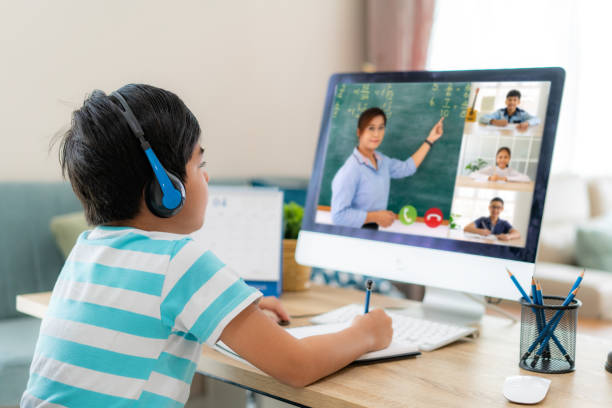For Parents
Tips for Parents to help students cope up with Virtual Learning
Admin Aug 31, 2022 01:00 PM

TAGS
Is virtual learning the new normal? The aftermath of a pandemic encompasses inevitable chaos in the lives of people. In this helpless scenario, coping with the revolutionary changes in the field of learning can be tricky for the students and their parents.
Tips for Parents to Improve Virtual Learning for Kids
Soon after the onset of the pandemic, the closure of schools resulted in remote learning for an indefinite period. Parents play a vital role in helping children with virtual learning. Many children do not take virtual learning very seriously, as the learning environment has suddenly changed. So how can parents make their children understand that virtual learning is the new normal? What ways would help them cope better with this new normal of studying?
1. Create a dedicated virtual learning environment
The kind of space in which you learn directly impacts your productivity. Studying in bed can be detrimental to one's productivity because subconsciously, we associate beds with comfort and sleep. The study states that you must have the right setup to align your thoughts with a task you intend to do. A dedicated study space also brings confidence, motivation, and a sense of discipline to children's minds.
Regarding remote learning, it is suggested to have a desk and chair set up for the child, similar to what they have in a classroom. If not, placing a chair against a flat elevated surface or platform can also be useful. It is always good to be ready with the required materials before the class starts. The study area should be well lit to avoid strain on the student's eyes.
2. Following a routine

Establishing an organized routine can prevent students from plugging away from their online learning sessions. Activities like waking up on time, having a healthy breakfast, and dressing up immaculately for school subconsciously demands the child to focus. Keeping the desk organized helps the child work independently and effectively and promotes decision-making. Moreover, it induces a sense of responsibility.
On the contrary, being unorganized hampers productivity distracts them, and can affect the overall performance and learning ability. Systematizing the notes according to the subjects would help them perform better in exams. From prioritizing your work to setting achievable short-term goals can make life much easier and increase your academic score. It may not seem like it, but teaching a child to pick up their plates or put freshly laundered clothes away can build their brain and prepare them for challenging academic opportunities.
3. Familiarize them with the concept of virtual learning
Generally, humans are hesitant toward new activities. Especially with kids, new situations can make them a bit nervous. Lack of predictability is often causing the emotions that derail learning says Professor Wahman, which is why increasing predictability can help. Describe the virtual learning process and the reasons behind the shift from brick to click learning. Assist them with their projects, assignments, or presentations; some of these can be an entirely new experience.
Minimal efforts in building their technical knowledge will help them in the long run. Know what platforms and software children are using. Co-view, co-play, and co-engage with your children using the screen; encourage social interactions, bonding, and learning. Don't just monitor them online; interact with them, so you can understand what they are doing and be a part of it. Explore new aspects, new tools, and new settings of different apps along with them as that would keep them engaged.
4. Uncover the links between lessons and their values
There are instances when children struggle to obtain clarity on their lessons. Rote learning is detrimental and outdated as it leaves a child with an unclear, perplexed state of mind. Endeavour to build a deeper understanding of concepts in the minds of children. The easiest way to go about it is to share relatable examples or your personal experiences with them.
Generating links between written concepts and hands-on experiences will develop a stronger understanding and trigger further learning. Concept mapping helps children introspect whether they have been aware of what they are learning. At the same time, encourage students to look for ways that academic content aligns with their values for overall personality development.

5. Build a healthy relationship
Relationship-building is vital in ways we don't even realize. Children learn relationship-building from their parents, and their bond with parents forms a basis of the general social behaviour of a child. Through relationships, children discover who they are and learn to understand others. For example, when a school child watches his friend topple over a football in the playground, he runs with a first aid kit and a bottle of water. He does exactly what he has seen his mommy do for him. This child is learning to empathize with or understand another's feelings and experiences.
Researchers have proven that supportive relationships impact their schoolwork, as the child works harder for parents and teachers that are compassionate towards them. A secure attachment leads to healthy social, emotional, cognitive, and motivational development. Avoid yelling at them, as hitting them can be as harmful. Keep things light and playful as much as possible. Instead of letting them sit back and watch a tv show in their room, ask them to arrange virtual meets with their friends where they could discuss some hilarious moments in class that day.
6. Incorporate curiousness
Children are naturally curious. Sometimes, they ask the most unimaginable, albeit the most interesting, questions, and when that happens, it is the responsibility of a parent to put forth the answers. Answer them clearly to promote understanding. They are more likely to be engaged that way. Curiosity prepares the brain for learning and increases concentration while studying. Most speakers start with a question, creating a hook that keeps you involved. The key is to retain that hook.
When children are curious, the brain becomes a fast-working, information-gathering tool and retains information that might not even interest them. Normally considered boring or difficult subjects might also be fascinating if presented compellingly. Asking them questions related to any topics and lessons would evoke the child to read more, discuss with their class teachers and gradually learn. Incorporating a sense of safety and confidence in children who fearlessly raise their doubts without being intimidated by whosoever will help them build a better understanding and a better personality.
7. Focus on their strengths

Our instinct tells us to up light children in the areas they are weak. However, doing so might cause them to disengage from virtual learning. Pulling up areas of weakness might even lead to withdrawal from the subjects they find truly intriguing. On the other hand, focusing on their strengths produces a feeling of content, greater school engagement, and higher academic achievement levels. Put some thought into what engages your child the most.
The first step to a strength-based approach is to help children learn what their strengths are. Discuss with their teachers what qualities they display or what captivates them. At the same time, request the teachers to provide opportunities to use those talents and, theoretically, even allow the choice of projects or assignments based on their strengths. If it seems feasible, equip them with the resources required to practice more of what they enjoy. If not, introduce some basic level online courses that can give them more exposure and knowledge on their subject of interest.
8. Positive reinforcement works wonders
There is no better way to boost your child's confidence than praising them either verbally or by certain gestures like patting them on their back. Appreciate them even for their slightest participation in activities or for any rectitude they show. If they prepare a presentation once, compliment them on their work. Use words like "I'm glad to watch you try," "you're doing great," and "proud of you," and next thing you know, they will put twice the effort they put in the first attempt. Children feel noticed, validated, and approved of, so they continue the behaviour they are praised for. Moreover, they realize their positive qualities and actions. These are minimal rewards, having the greatest impact on the children and shaping them to be academically and socially successful.
Final Words
The onset of the pandemic shook things up in all areas, including education, schools, and classes. According to Unesco, the education of nearly 1.6 billion pupils in 190 countries has so far been affected – 90% of the world's school-age children. The stresses of living in isolation under quarantine have had some serious impact on their social, emotional, and cognitive development. Hence, this is the time they need their parents the most. All these elements boil down to the fact that parents must create a positive environment and growth-oriented mindset among children. However, while trying to practice these approaches, don't forget to create tech-free zones with no screens around to ensure a healthier peace of mind.
Besides, you can also look for career counselling online that will enable your child to discover their areas of interest at an early age. As a result, they will be able to develop an interest in virtual learning in them.
Search
Latest Blogs

Exploring Opportunities in Emerging Engineering field
Admin
Dec 14, 2024 05:18 PM

Navigating College Majors
Admin
Sep 25, 2024 04:04 PM

Tools for Measuring Strengths For Career
Admin
Sep 25, 2024 03:27 PM
Interested in getting latest updates?
SUBSCRIBE


















